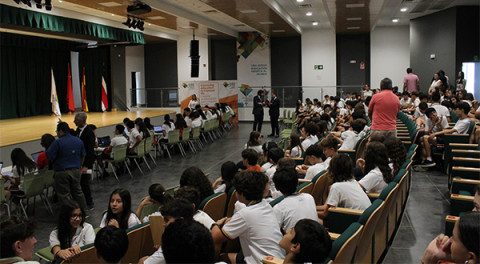CSIC takes our 'Escape Road' to Costa Rica

The Spanish National Research Council (CSIC) has brought its "Escape Road: In Search of Nobel and Non-Nobel Women Scientists" to Costa Rica, thanks to its scientific diplomacy initiatives. "This is a first step to strengthen international ties in scientific outreach with a gender perspective," celebrates Isabel Díaz, Deputy Vice President of Internationalization and Cooperation at CSIC and researcher at the Institute of Catalysis and Petrochemistry (ICP-CSIC).
"The initiative is far exceeding the expectations of a local project we started in 2019," adds Silvia Gallego, a scientist at the Institute of Materials Science of Madrid (ICMM-CSIC) and one of the creators of the activity. "This is our first international success with students," she adds.
The scavenger hunt about Nobel-winning women scientists is aimed at all ages and is organized by ten CSIC centers on the Cantoblanco Campus in Madrid. "Since its launch in 2019, we have reached more than 15,000 people with our physical version and about 50,000 online," comments Susana de Lucas, outreach manager at the National Center for Biotechnology (CNB-CSIC).
"It's a fantastic initiative because it highlights some of the most outstanding women in the history of science," notes Eva Martínez, Spain's ambassador to Costa Rica. "It provides a lot of information and, above all, many threads that both teachers and students can pull to learn more," adds Juan Sáinz, Consul and Cultural and Scientific Affairs Counselor at the Spanish Embassy in Costa Rica.
For several months, "Escape Road" has been included in the catalog of activities that CSIC offers to Spanish embassies through the Spanish Agency for International Development Cooperation (AECID) as part of the scientific diplomacy strategies of the scientific organization. "It is a pride and a satisfaction to be part of this project," says Díaz, who, as a researcher at ICP, is involved in developing and coordinating "Escape Road."
In Costa Rica, the Spanish Embassy has taken the online version to several educational centers, where around 500 students have been able to play and reflect on Nobel-winning women scientists. "We hope to continue increasing its reach by collaborating with the Costa Rican Ministry of Public Education," adds Martínez, explaining that the reception of the scavenger hunt has been "excellent." Indeed, she states that they intend to continue fostering collaboration between scientific communities from different countries to make female role models in science more visible.
"It generates interest and active participation through the questions," describes the ambassador, who also explains that, thanks to the recommendation of the CSIC team, they have incorporated a small colloquium with some of the Spanish scientists working in Costa Rica into the scavenger hunt, a feat achieved with the help of the newly created Spanish-Costa Rican Network of Science, Innovation, and Technology (RECIT).
"The coordination facilitated by the Ministry of Foreign Affairs, EU and Cooperation has allowed us to rely on the excellent work of an institution as important as CSIC," adds the ambassador, highlighting that this entity "is doing an excellent job in the field of outreach, which is undoubtedly worth exporting to other friendly countries, such as Costa Rica."
Promoting Equity
"Escape Road: In Search of Nobel and Non-Nobel Women Scientists" was born in 2019 as an original idea to celebrate February 11, International Day of Women and Girls in Science. Promoted by the equality commissions of ten CSIC centers on the Cantoblanco Campus, it is an example of interdisciplinary outreach collaboration with a gender perspective that has reached more than 60,000 people in the five years since its launch. Additionally, it has contributed to expanding the outreach offerings of the centers and their participation in major events such as Researchers' Night.
The organizing centers are the Institute of Materials Science of Madrid (ICMM), the Institute of Ceramics and Glass (ICV), the Institute of Catalysis and Petrochemistry (ICP), the National Center for Biotechnology (CNB), the Severo Ochoa Molecular Biology Center (CBM-SO), the Institute of Food Science Research (CIAL), the Institute of Theoretical Physics (IFT), the Institute of Mathematical Sciences (ICMAT), the Institute of Nano and Microelectronics (IMN), and the Sols-Morreale Institute for Biomedical Research.
Instituto de Ciencia de Materiales de Madrid (ICMM)
Sor Juana Ines de la Cruz, 3
Cantoblanco, 28049
Madrid, España
Telephone: (+34) 91 334 90 00
Email: @email
Communication Office: @email

Acknowledge the Severo Ochoa Centres of Excellence program through Grant CEX2024-001445-S/ financiado por MICIU/AEI / 10.13039/501100011033

Contacto | Accesibilidad | Aviso legal | Política de Cookies | Protección de datos
